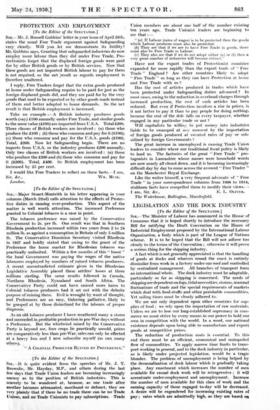[To the Editor of the. SPECTATOR.] SIR,—It is quite evident
from the speeches of Mr. J. T. Brownlie,. Mr. Hayday, M.P., and others during the last few days that Trade .Union leaders are becoming increasingly uneasy as to the position of British industries. This is scarcely to be wondered at, because, as one trade after another becomes attenuated, moribund• or defunct, they see very plainly-that if there -be no trade there can be no Trade Unions, and no Trade Unionists to pay subscriptions. Trade Union members are about one half of the number existing ten years ago. Trade Unionist leaders are beginning to see that :- " (a) If Labour (rates of wages) is to be protected then the goods which Labour produces must also be protected. • (b) They see that if we are to have Free Trade in goods, there must also be Free Trade in Labour.
(c) They also see that if we do not adopt either. (a) or (b). then a very great number of industries will become extinct."
Have not the export trades of Protectionist countries expanded far more rapidly than the export trade of Free Trade " England ? Are other countries likely to adopt " Free Trade " so long as they can have Protection at home
and Free Trade with us ?
Has the cost of articles produced in trades which have been protected under Safeguarding duties advanced ? In most cases, owing to the reduction in overhead charges through increased production, the cost of such articles has been reduced. But even if Protection involves a rise in prices, is it not better to pay it than to pay people for doing nothing, because the cost of the dole falls on every taxpayer, whether engaged in any particular trade or not ?
Will capitalists be fo put money into industries
liable to be swamped at any moment by the iMportation of foreign goods produced at sweated rates of pay or sub- sidized by foreign Governments ?
The great increase in unemployed is causing Trade Union leaders to consider where our traditional fiscal policy is likely to land us. The factories of the great " Free Trade " pro- tagonists in Lancashire whose names were household words are now nearly all closed down, and it is becoming increasingly difficult day by day to come across the avowed "'Free Trader " on the Manchester Royal Exchange.
Like the writer himself, a very frequent advocate of `.` Free Trade " in your correspondence columns from 1906 to 1914; stubborn facts have compelled them to modify their views.—
I am, Sir, &c., .E. L. OLIVER, The Waterhouse, Buffington, Macclesfield.-






































 Previous page
Previous page